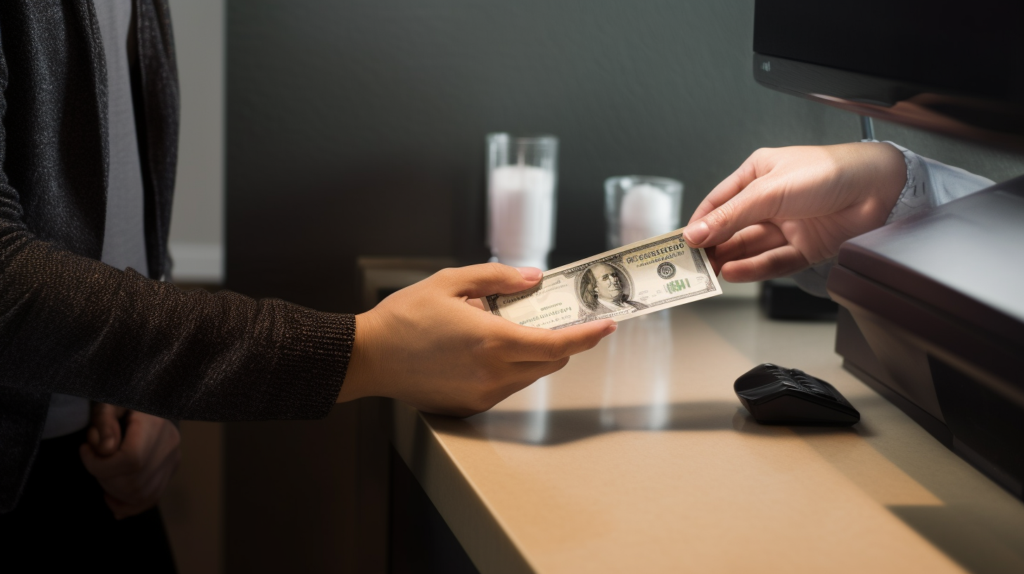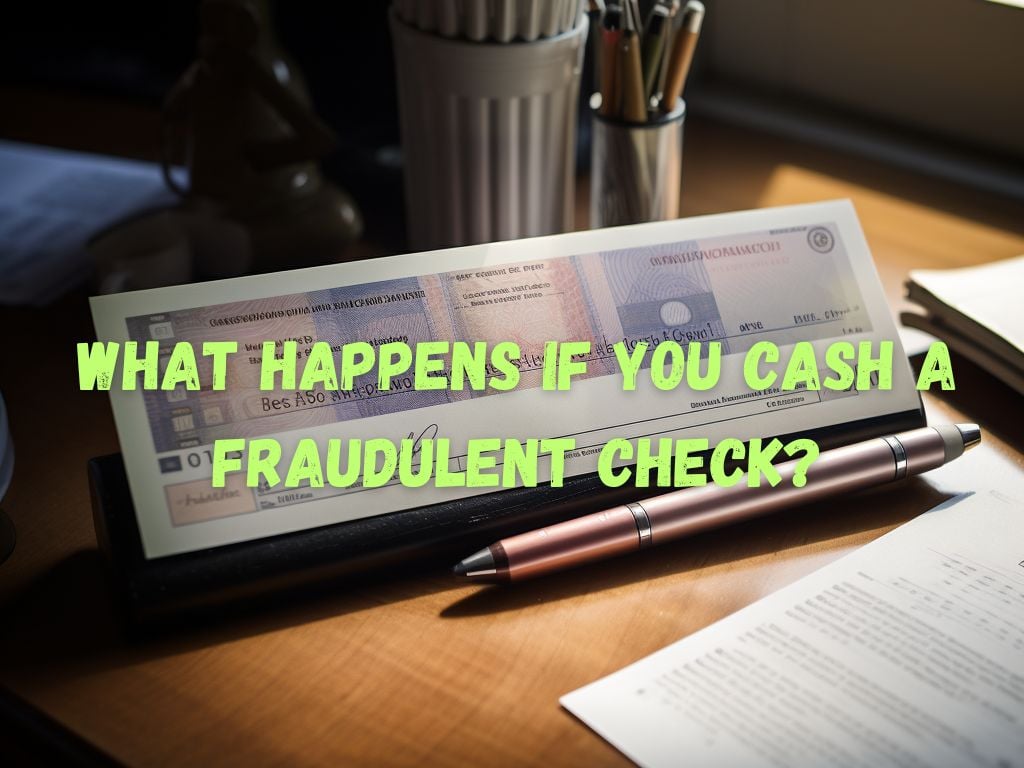Cashing a fraudulent check can lead to severe consequences, both legally and financially. Understanding the risks involved is crucial to protect yourself from becoming a victim of check fraud.
In this comprehensive guide, we will explore what happens if you cash a fraudulent check, including the legal implications, financial liabilities, and steps to take if you suspect a fake check.
Definition of a Fraudulent Check
A fraudulent check, also known as a fake check or forged check, is a phony financial instrument that is presented to a bank or financial institution with the intention of obtaining funds that do not exist.
These checks may be counterfeited, stolen, altered, or created using advanced technology to mimic genuine checks. Scammers often devise elaborate schemes to deceive unsuspecting individuals into cashing such checks.

How Does Cashing a Fraudulent Check Work?
Scammers use a variety of methods to persuade individuals to cash fraudulent checks. They may target victims through online classifieds, email scams, or even in-person encounters.
The scammers exploit the victim’s trust or desperation, enticing them with promises of easy money or an appealing business opportunity.
It is essential to be aware of the signs that indicate a check may be fraudulent. Look out for checks with unusual or suspicious origins, misspelled words, poor printing quality, or mismatched fonts.
Additionally, if you are asked to send a portion of the funds back to the sender or a third party, it is a red flag that the check may be fake.
What Happens If You Cash a Fraudulent Check? Consequences
Legal Implications
Cashing a fraudulent check is a serious offense that can lead to both misdemeanor and felony charges, depending on the circumstances and the amount involved. The intentional act of cashing a fraudulent check is considered a criminal offense.
It is essential to note that ignorance or unintentionally cashing a fake check does not absolve individuals from facing legal consequences.
If convicted, individuals can face penalties, fines, and even imprisonment. Misdemeanor charges can result in a sentence of up to one year in jail, while felony charges can lead to several years of imprisonment.
Criminal Charges and Potential Jail Time
Cashing a fraudulent check can result in criminal charges such as forgery, fraud, or identity theft. These charges can lead to lengthy investigations, court proceedings, and potential convictions.
If found guilty, individuals can face incarceration and may carry a permanent criminal record, affecting future job prospects and personal reputation.
Liabilities and Financial Impact
The Bank’s Role and Responsibility
When it comes to cashing fraudulent checks, financial institutions have protocols to detect and prevent such activities. However, due to the complexity of check fraud schemes, some fraudulent checks may go undetected initially.
Banks have policies that address fraud cases, and they analyze checks for any suspicious activity. If a bank determines that a check is fraudulent, they may reverse the deposited funds, leaving the victim responsible for reimbursing the bank.
Additionally, the bank may close the victim’s account to prevent further fraudulent activity.

Personal Financial Responsibilities
Cashing a fraudulent check can have severe financial consequences for the victim. When a bank discovers the fraud, they will reverse the deposited funds, leaving the victim responsible for the lost amount.
If individuals have already withdrawn or used the funds, they are legally obligated to repay the bank.
Moreover, cashing a fraudulent check can negatively impact an individual’s credit score. Late repayments, defaults, or unpaid debts resulting from the financial loss incurred through a fake check can tarnish one’s creditworthiness and hinder future borrowing.
In some cases, victims may face civil lawsuits for damages. If the bank or another party suffers financial losses as a result of cashing a fraudulent check, they may pursue legal action to recover their losses, holding the victim accountable.
Reporting and Resolving Fraudulent Checks
Steps to Take If You Suspect a Fraudulent Check
If you suspect that a check you have received or cashed is fraudulent, it is crucial to take immediate action. The following steps can help protect your interests and aid in the resolution of the fraudulent check:
- Contact Your Bank: Inform your bank about the situation and provide them with any evidence or information related to the fraudulent check. They will guide you through the necessary procedures and assist in mitigating the financial impact.
- File a Police Report: Report the fraudulent check and associated details to your local law enforcement agency. Providing them with all relevant information can aid in their investigation and increase the chances of apprehending the scammers.
- Report to the Federal Trade Commission (FTC): Submit a complaint to the FTC through their online portal or by phone. The FTC collects information on fraudulent activities to aid in consumer protection efforts.
Working with Law Enforcement and Banking Authorities
Cooperating with law enforcement agencies and banking authorities is critical in resolving fraudulent check cases. Provide any evidence, documentation, or communication related to the scam to aid in their investigations.
Stay in touch with your bank throughout the process, as they will be working with you to identify the best course of action.

Tips to Protect Yourself from Fraudulent Checks
Education and Awareness
Educating yourself about common scams, including fraudulent check schemes, is essential to avoid falling victim. Stay updated on current fraud trends, research popular scams, and learn how to identify red flags.
Secure Banking Practices
Adopt secure banking practices to minimize the risk of cashing fraudulent checks. Use reputable banks and financial institutions, regularly review your account statements for any suspicious activity, and enable notification alerts to stay informed about transactions.
Verifying Checks and Sources
Before cashing a check, verify its authenticity by contacting the issuing bank directly. Ensure that the check matches the intended purpose, such as payment for goods or services, by contacting the payer and confirming the transaction details.
Frequently Asked Questions
Can you go to jail for cashing a fraudulent check unknowingly?
That the fraudulent check was cashed unknowingly may reduce the severity of the charges you face. However, ignorance or lack of intent does not completely absolve individuals from potential legal consequences.
Is the bank responsible for cashing a forged or fake check?
Financial institutions have a responsibility to detect and prevent the cashing of fraudulent checks. However, there may be instances where fraudulent checks go undetected initially.
Ultimately, the responsibility for cashing a fake check falls on the individual who presented the check for payment.
What are the potential consequences of depositing a fake check online?
Depositing a fake check online poses similar risks as cashing physical checks. If the check is discovered to be fraudulent, the funds will be reversed, and the individual can face financial liabilities and other legal consequences.
Are there any legal repercussions for cashing a fraudulent check without knowing it?
Cashing a fraudulent check without knowledge may reduce the severity of the charges. However, legal repercussions may still apply, depending on the specific circumstances of the case.
Conclusion
Cashing a fraudulent check can have serious legal and financial consequences. It is crucial to remain vigilant and skeptical of any check that appears suspicious or originates from unknown sources.
By understanding the risks, liabilities, and legal ramifications involved, individuals can take proactive measures to protect themselves, reporting and resolving fraudulent check incidents promptly.
Stay informed, educate others, and adopt secure banking practices to safeguard against falling victim to check fraud schemes.


 Tags:
Tags:










